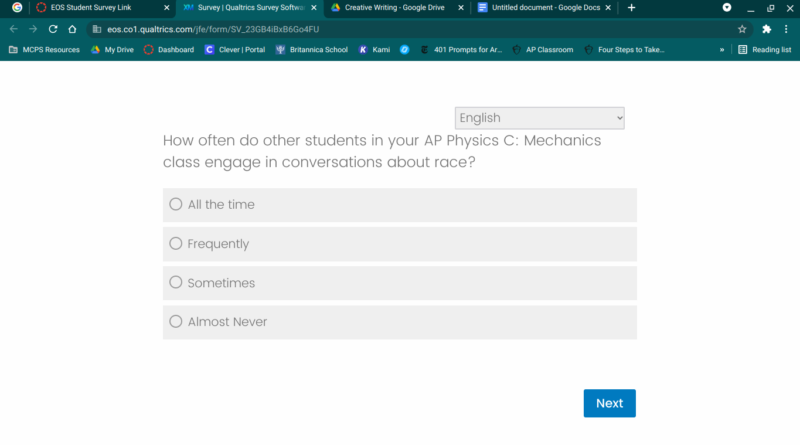Are EOS Surveys Effective at Promoting a Positive AP Environment?
This week in math classes, many students will be taking or have taken Equal Opportunity School (EOS) surveys. These surveys are sent out annually in order to help schools and school systems gauge students’ social, emotional, and academic environment and address any challenges.
The surveys consist of open ended questions as well as multiple choice questions that require you to choose the best answer(s). Each survey is different depending on the student, but for me, I was asked questions like “How would you describe yourself to teachers?”, “How often is race discussed in your classes?”, and “Why are you taking AP classes?”
The intent behind the survey is great. Assuming each student answers honestly and thoroughly (which in itself is a big ask), this is a great way to get an understanding of how schools can improve. But the fact is, this intent is not fulfilled as planned. Let’s focus on the questions that specifically ask about AP classes.
This year and last year, I ended up with a good amount of questions on my AP class experience. Of course, there were the basic questions like “Is this your first year taking AP classes?” and “What AP classes are you taking?” But there are always a few questions related to AP culture and its atmosphere that are ideally supposed to see how students feel in their classrooms.
The AP program is inherently biased towards a certain set of students: those who have money and those who plan to go to a two or four year college. The highlight of AP classes is the possibility of earning college credit based on your end of the year test score, along with other benefits like a boosted GPA and an impressively rigorous course load to show on applications. When questions come up about motivation to take AP classes, there are options like “to develop good study skills” or other reasons with not a lot of weight. But honestly, if your future plans involve a college, and if you’re trying to get in and out of there as quickly and as cheaply as possible, you’re likely taking AP classes.
But even for students who don’t fall into that targeted group, there are always outside influences: parents and peer pressure. Both of these sources of motivation play into the AP culture. Socially, it looks “better” to take AP classes.
These questions, again when answered, honestly can help schools get a good idea of what pressures students are feeling. But, how does this translate into action? If a student says their main motivation for taking AP classes is because it’s just part of school culture, is that a negative influence or a positive one? Who’s to say that a parent’s influence isn’t excessive or stressful? What if the influence is different for different AP classes? Does a student actually enjoy the class, or are they taking it because it’s just something they “have” to do?
The surveys are a good start. But, the questions simply aren’t specific enough to make relevant progress towards promoting a healthier AP environment.




